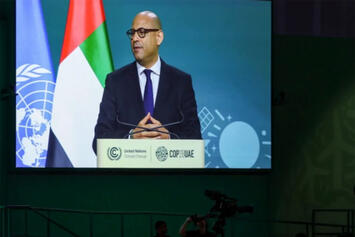
On Thursday morning, I spoke to the Nebraska Rural Electric Association in Kearney. Before my speech, I chatted with my friend, Chet McWhorter, the general manager of the Cuming County Public Power District. Chet’s district, formed in 1936, delivers power to about 3,900 customers in northeastern Nebraska via some 1,200 miles of wire. The average cost of electricity in the CCPPD is $0.10 per kilowatt-hour, significantly less than the national average of about $0.12.
As I was talking to Chet, it occurred to me that his power district and the people I was talking to in Kearney, are about as far away as one can get from the COP 28 climate meeting that began on Thursday in Dubai. Yes, it may be possible to find spots on the globe that are more distant from Dubai than Kearney is, but the Nebraskans I spoke to are — from a political and cultural standpoint — galaxies away from the ecosystem inhabited by the people who will be at the Dubai climate confab. Agriculture dominates in Cuming County, which is a big producer of cattle, chickens, hogs, and corn. “We feed the world and pretty much ignore what’s happening everywhere else,” Chet told me.
Some 70,000 people are expected to attend the meeting in Dubai. That’s twice the number that attended COP27 last year in Egypt. The surging number of attendees shows that the business of climate change, is, well, a business. As my friend, Roger Pielke Jr., observed on Sunday:
Climate is now a full-scale industry, with fortunes and careers to be made, and perhaps lost. That in itself is not necessarily good or bad — health, defense, finance and so on are also industries. It goes with the territory of being an important policy and political issue. Along with the climate industrial complex comes massive vested interests, ranging from the financial to the professional to the political.
Roger also reported on a new study by Masahiro Suzuki, Jessica Jewell, and Aleh Cherp. (If you haven’t subscribed to Roger’s Substack, you should do so now.) The study found that despite all the hoopla around climate meetings, they’ve had little discernible impact on energy policy. Here are the critical lines from the report (as with the above, emphasis is added):
Climate policies are often assumed to have significant impacts on the nature and speed of energy transitions...We find that climate policies have so far had limited impacts: while they may have influenced the choice of deployed technologies and the type of transitions, they have not accelerated the growth of low-carbon technologies or hastened the decline of fossil fuels. Instead, electricity transitions in the G7 and the EU have strongly correlated with the changes in electricity demand.
That study, as well as my own experience of watching the COP meetings , leads me to believe that the outcome of the Dubai meeting will, once again, yield lots of promises but scant real action.
Read the rest of this piece at Robert Bryce Substack.
Robert Bryce is a Texas-based author, journalist, film producer, and podcaster. His articles have appeared in a myriad of publications including the Wall Street Journal, New York Times, Forbes, Time, Austin Chronicle, and Sydney Morning Herald.
Photo: UN climate change executive secretary Simon Stiell speaking in Dubai on Thursday. Source: unfccc.int












